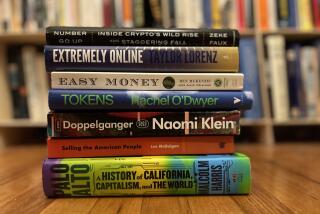The Internet--This Year’s Virtual Favorite for ‘Man of the Year’
- Share via
With holiday hindsight, Time magazine’s decision a decade ago to name the computer as its “Man of the Year” doesn’t look half bad. This year, Time’s Zeitgeist award should go to a technology that’s got more character, influence and complexity than any purely human contender.
It’s a uniquely American medium that’s grown more rapidly than John Malone’s TCI ever did; that’s even more global than Ted (1991 Man of the Year) Turner’s CNN, and is light-years more interactive than Barry Diller’s QVC Network, with or without Paramount.
It’s called the Internet and there has never been a mass medium quite like it.
No one really “owns” the Internet, and no one really “manages” it. But over the past year, it has exploded into public consciousness as the multimedia phenomenon that merits serious attention from anyone who wants to understand what the future will look like.
In barely 12 months, the Internet has gone from a technovelty to a chic media cliche. The Net became a front-page story in every major newspaper in America (including this one); cover story for magazines such as the New Republic; a standing reference on CNN, and, inevitably, the inspiration for a New Yorker cartoon--two canines at a keyboard, with one pooch saying to the other, “On the Internet, nobody knows you’re a dog.”
When Al Gore speechifies about--all together now!--”The Information Superhighway,” when Bell Atlantic Chairman Ray Smith waxes lyrical about his company’s proposed $30-billion-plus acquisition of TCI, and when Barry Diller preaches the gospel of multimedia interactivity, their visions are based less on pie-in-the-sky promises than the Internet’s astonishing growth and evolution. Media convergence? Internet defines the state of the art. Book publishers, magazine publishers and cable companies who hadn’t even heard of the Internet two years ago now pump their media content into the Net. Can Sega and Nintendo be far behind?
Originally designed 25 years ago to be the computer network for the Pentagon’s research community, Internet has evolved into the most important computer network in the world. Think of it as a network of networks. According to the Internet Index, a fact-list compiled by someone who monitors Net usage, the annual growth rate for worldwide web traffic is 341,634%, and every 10 minutes, a new network is connected. As media increasingly become digital and computer networks dramatically grow in speed and capacity, the Internet is evolving into a cost-effective meta-medium that can simultaneously carry everything from a new Stephen King short story to National Public Radio to video games. It is often cheaper to log on to Internet than to subscribe to cable TV.
But far more important than any information it carries are the communities that Internet creates. The Internet is more about relationships between people than data bursts between machines. Every minute of every day, thousands of microcommunities are exchanging ideas and conversation in real-time or asynchronously. Values like privacy and intimacy, censorship and sharing are what matter. De Tocqueville would marvel--but perhaps not be surprised--at the Internet as the natural technological extension of those dual American ideals, democracy and the frontier.
In fact, the Internet embodies just the kind of paradoxes that Americans are so good at and the rest of the world finds so irresistible. The Internet is American technology as pop culture and American pop culture as technology. It’s a slice of America and a slice of the world. It’s simultaneously everywhere and nowhere. It’s a network for the elite, yet it’s very egalitarian.
There’s no real government, yet no real anarchy. It’s a creature of government planners that’s also the soul of new enterprise and entrepreneurship. It’s a product of Cold War funding that has become a virtual playground for children of all ages. The brightest scientists in the world use it as a medium for collaboration. Businesses want to turn it into a marketplace. There’s pornography, and there’s the Bible. People have best friends there that they’ve never met in person. Even the French, despite their fears of American technological imperialism, want to post imagery of their art treasures on the Net.
The Internet has been relentlessly growing and succeeding because it represents everything that’s best about America--the ingenuity, the diversity and the collective responsibility that carefully balances individual rights with community obligations.
Of course, the Internet now faces precisely the same kinds of questions and doubts that inevitably confront any growing community:
* Just how commercial will the Internet become when the Barry Dillers and Raymond Smiths decide to take a byte?
* How much should Internet’s future be shaped by top-down planning versus bottom-up dynamics?
* Is the Internet community fragmenting, undermining comity and interaction?
* How will greater capacity change the way people relate to each other?
* Is the Internet too global at the expense of being local? Who really pays--and how much?
Better than any other medium, the Internet embodies the critical questions and concerns of the American community--and that means the future of Internet will reveal an awful lot about the future of America.
In many respects, making the Internet “Man of the Year” would be less a recapitulation of Time’s 1982 award to the computer than a reminder of Time’s first “Man of the Year” in 1927--Charles Lindbergh. Then, an adventurous American and a new technology captured the imagination of the world. Today, it’s only appropriate that we have an adventurous community and a new technology that’s doing the same thing.
Michael Schrage is a writer, consultant and research associate at the Massachusetts Institute of Technology. He writes this column independently for The Times. He can be reached by electronic mail at schrage@latimes.com on the Internet.
More to Read
The biggest entertainment stories
Get our big stories about Hollywood, film, television, music, arts, culture and more right in your inbox as soon as they publish.
You may occasionally receive promotional content from the Los Angeles Times.










